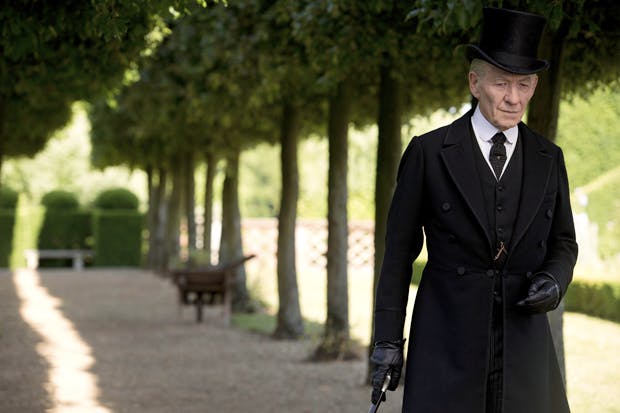Mr Holmes stars Ian McKellen as the great detective in his old age and while it could have proved a touching character study — who are you, not just when your mind starts to fail, but when the mind for which you are famed starts to fail? — it veers off in so many tedious directions that the end product is lumbering and leaden and will require 22 espressos thrown back in quick succession beforehand, along with several Red Bulls, if you are to have any hope of staying awake. (I did not know this beforehand, and therefore dozed quite significantly.) You know, if I were invited to give a talk at some film school, which still hasn’t happened, weirdly, I would say, ‘Kids, before you point a single camera, sit down and ask yourselves: what is this film about? What do I wish to say?’ Bizarre, how many films don’t do this, even though it is so …ahem …elementary?
Loosely based on Mitch Cullin’s novel A Slight Trick of the Mind, and directed by Bill Condon (Dreamgirls, Gods and Monsters, The Fifth Estate), this film finds Holmes late in life, aged 93, retired and living on the south coast, where he tends to his beloved apiaries and bees. (This ultimately leads to a bee denouement that is mightily unkind to wasps, who can’t help being wasps, and not bees, and from now on, just so you’re aware, I’m #teamwasp.) Try as he might, Holmes is failing, his memory is abandoning him, and when meeting people he has to jot their names on his shirt cuff to serve as an aide-memoire. His doctor (Roger Allam) gives him a diary, which helpfully tells us the year (1947), and says every time you forget something, make a mark on the day. ‘What if I forget to make a mark?’ asks Holmes, sensibly. But Holmes never forgets in this instance, because the plot demands it, and this is just one of the scenarios that stick out like a sore thumb: there not because it would happen, but because the plot needs it to happen. If the storytelling were to whoosh you up, you wouldn’t notice, but the storytelling is so heavy-handed — so un-whooshy — you absolutely do.
Holmes does not live alone as he is looked after by a widowed housekeeper, Mrs Munro (Laura Linney, employing an accent that is sometimes West Country and sometimes Scottish and sometimes of her own devising), who has a young son, Roger (Milo Parker; sensational eyelashes). Roger adopts Holmes as a surrogate father, as encouraged by Holmes, who likes the boy’s way with bees, but as not encouraged by the boy’s mother, who fears losing her son’s affection. So there’s Holmes’s oncoming dementia as a strand, and his relationship with his housekeeper as a strand, and also Holmes’s relationship with Watson’s stories about him as a strand — they were greatly embellished, he complains, and, no, he’s never worn a deerstalker — and if this still isn’t strand-tastic enough for you, there are yet more, including two narratives told in flashback. One concerns Holmes’s trip to Japan, where he learns something unexpected from his host, and the other focuses on his last case and a romantic infatuation, which, had he behaved differently, might have led to a different outcome altogether, and now he might not be so alone. There is a decent film in here somewhere, and that film may be about the inner life of a man whose great mind did not allow for intimacy and now regrets it. But that film’s not this film, alas.
There is, in fact, very little poignancy, as everything is writ too large, including McKellen’s performance. Wearing a big prosthetic nose, he goes to town hammily and, as such, always seems like Ian McKellen going to town, hammily, in a big nose. Meanwhile, although Frances de la Tour and Frances Barber provide terrific cameos — the first Frances plays a highly strung music teacher; the second camps it up in a film-within-the-film — they tip the whole thing over into comedy. So there’s another strand: the comic one.
With its lack of focus and, also, lack of dramatic tension — each narrative wends its own sweet way without giving us any reason to be interested in what might happen — it all feels horribly inert, and then ends not just in a wasp holocaust (#teamwasp!) but also with the most gruesome burst of sentimentality. Does Mrs Munro abandon Holmes and decamp with Roger to Portsmouth, where she has been offered a job housekeeping at a hotel? Or do the three become the best of friends as tears glisten in all their eyes? What do you think? So, lumpen and leaden, but you may discount my verdict, if you so please, as it’s not as if I’ve ever been famed for my mind. Weirdly.
Got something to add? Join the discussion and comment below.
Get 10 issues for just $10
Subscribe to The Spectator Australia today for the next 10 magazine issues, plus full online access, for just $10.














Comments
Don't miss out
Join the conversation with other Spectator Australia readers. Subscribe to leave a comment.
SUBSCRIBEAlready a subscriber? Log in